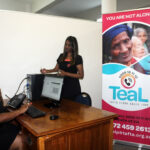10 routine health checks that could save your life
These past 18 months have seen us focus on our health like never before. There’s nothing like a life-threatening disease to remind you that you can’t take your good health for granted.
But, Covid-19 aside, there are many other diseases and conditions that can threaten our health. Now is a good time to talk about the preventative measures we can take … in particular, medical screening tests that should be done regularly. This is especially important for those who are getting on in years.
Elders living at Tafta’s Kings Hall will have access to these and other facilities without leaving the building, owing to a new low cost health clinic we hope to set up on the premises. This will be extended to a mobile clinic service for those living in other Tafta homes, if all goes according to plan.
Regardless of where you go for your regular health checks, these are the ten most important tests to monitor health and pick up conditions before they become life threatening.
1. Blood Pressure
Perhaps the most common and well know test, blood pressure should be regularly tested, because it’s possible to have dangerously high blood pressure and not know it. You don’t have to make a special appointment with your doctor for this. Many pharmacies and medical centres offer walk in clinic facilities for blood pressure testing. If your blood pressure is higher than normal, or you have other risk factors, you may need to test more often.
2. Eye test
The risk of developing eye diseases, such as macular degeneration, cataracts and glaucoma, increase with age. Macular degeneration can lead to irreversible loss of vision, as can glaucoma (pressure in the eye). Since glaucoma has no symptoms, it’s essential to have the test every year to protect your eyesight.
3. Hearing test
At least 25% of people over the age of 65 have disabling hearing loss, most of which is treatable. That number increases to 50% for the over 75s. Book a hearing test if you have difficulty following a conversation, especially in a noisy environment, such as a restaurant.
4. Cholesterol screening
High cholesterol levels are a major cause of heart attacks and strokes. Again, there are no symptoms. Regular testing is the only way to monitor your cholesterol level. Ideally, your total cholesterol – HDL “good” cholesterol and LDL “bad” cholesterol – should be between 4-5 mmol/L (millimoles per litre of blood). Over 6.5 mmol/L is considered very high, and above 7.8 mmol/L dangerous. If your cholesterol level is high, you may be able to treat if by adjusting your diet. Alternatively, your doctor may prescribe medication to control it.
5. Colorectal cancer screening
In South Africa, colon cancer is the second most common cancer among men, and the third most common among women. In its early stages, there are no symptoms, which means it is often not diagnosed until it has reached an advanced stage or spread to other parts of the body. Most medical aids offer annual free screening of a stool sample for traces of blood. Depending on the results, you may need to undergo a colonoscopy. You will be sedated and a fibreoptic camera used to scan your colon for cancerous polyps.
6. Bone density scan
Although both women and men can develop osteoporosis in later life, women are at greater risk. A bone density scan measures bone mass, which is a key indicator of bone strength. Regular bone scans are recommended after age 65, especially for women.
7. Vitamin D test
Many people are deficient in Vitamin D, also known as the ‘sunshine’ vitamin as it is produced when the skin is exposed to sunlight. It’s also present in foods like egg yolk, dairy and oily fish like salmon and sardines. This vitamin helps protect your bones. It may also defend against heart disease, diabetes, and some cancers. If you spend a lot of time indoors, you may be deficient in Vitamin D.
8. Blood sugar
Globally, diabetes is one of the most prevalent non-communicable diseases, and it’s on the increase as a result of unhealthy diet, obesity and an increasing sedentary lifestyle. Approximately 4 581 200 million adults in South Africa have the disease. Left untreated, diabetes can be life-threatening. You should have a fasting blood sugar test at least once every 3 years to screen for the disease. You may need to be tested more frequently if you develop symptoms such as extreme thirst, blurry vision, numbness or tingling in your hands or feet, fatigue or unexplained weight loss.
9. Mammogram
For women, a breast exam and mammogram is advised every 2 years from age 50, as the risk of breast cancer increases with age. A pelvic exam, Pap smear and HPV test is also recommended. You may think it’s unnecessary, but women over 60 still need to get regular pelvic exams, Pap smears, or human papillomavirus (HPV) tests. Older women can get cervical cancer or vaginal cancer. And the pelvic exam can detect a host of other conditions that may affect your health and quality of life (think incontinence!).
10. And for men, prostate cancer screening.
Prostate cancer can be detected either by a digital rectal exam or by measuring prostate-specific antigen (PSA) levels in your blood. Testing is recommended from age 50 for men who are not high risk, or earlier for those who have a family history of prostate cancer, or have an immediate relative who has died from the disease.
For people over the age of 50, especially, an annual check up is recommended, during which your doctor will routinely perform most of these tests. You can also protect your health by eating plenty of fresh fruit and vegetables, and avoiding fatty fast foods, stopping smoking, reducing alcohol intake to 3 units or less per week and exercising regularly.






 Valentine’s Day on a budget – love that doesn’t cost a thing!
Valentine’s Day on a budget – love that doesn’t cost a thing! Age-readiness vs Age-friendliness – preparing South Africa for long life
Age-readiness vs Age-friendliness – preparing South Africa for long life Sisonke – ‘we are together’ – is Tafta’s theme for 2026
Sisonke – ‘we are together’ – is Tafta’s theme for 2026 From Durban Social Worker to Global Champion for Older Persons
From Durban Social Worker to Global Champion for Older Persons Christmas joy – good food and good company, thanks to you!
Christmas joy – good food and good company, thanks to you! Robin Hood Foundation spreads love across Tafta Homes
Robin Hood Foundation spreads love across Tafta Homes 12 Days of Giving – spread joy to older people this Christmas
12 Days of Giving – spread joy to older people this Christmas Tafta resident pens powerful tribute to heritage and hope in new book
Tafta resident pens powerful tribute to heritage and hope in new book Introducing TEAL – our upgraded national Elder Abuse Helpline
Introducing TEAL – our upgraded national Elder Abuse Helpline Beat the year-end blues – 6 tips for staying positive during ‘silly season’
Beat the year-end blues – 6 tips for staying positive during ‘silly season’